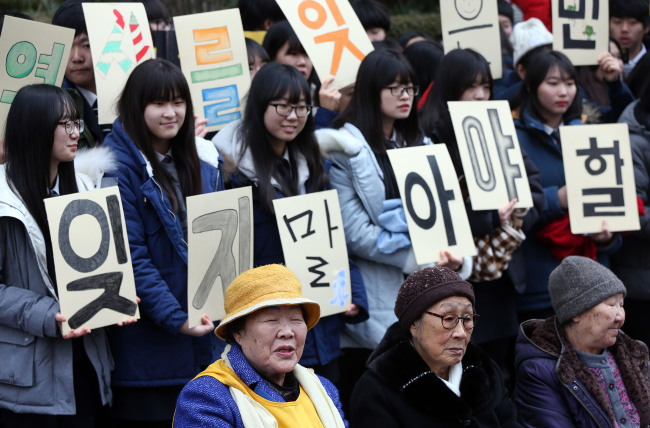Relations between Seoul and Tokyo face a rough ride yet again in 2015 as Japanese Prime Minister Shinzo Abe is set to expedite a series of revisionist foreign and security policies while showing little signs of atoning for the country’s imperial past.
The Park Geun-hye government is coming under mounting pressure, entering its third year and gearing up to reset the relationship with the old foe to mark the 50th anniversary of its normalization this year.
At home, President Park faces the challenge of cementing her diplomatic legacy. Though foreign affairs and security play a crucial role in shoring up the conservative leader’s approval ratings, she has been taking flak for unrealistic initiatives decorated with slogans rather than long-term strategies and action plans, a factor that complicates Korea’s attempt to improve relations with key neighbors like Japan and North Korea. Many experts criticize the presidential National Security Council’s lack of flexibility, dictated by rigid, hardline former military commanders and diplomats who put priority on maintaining the status quo over plain speaking.
Outside, the needs are evergrowing for a trilateral security partnership with the U.S. and Japan to better counter increasing North Korean nuclear threats and keep China in check.
The three countries recently agreed to share intelligence on Pyongyang’s nuclear and missile programs despite deep resentment here over military cooperation with the onetime occupier. The hard-won decision came after Seoul shelved at the last minute its plan for a bilateral accord with Tokyo in 2012.
 |
Victims of Japan’s sexual slavery during World War II and students participate in a weekly protest in front of the Japanese Embassy in downtown Seoul on Dec. 24. (Yonhap) |
“The signing of the three-way agreement coincides with the U.S. position to carry out its regional security policy not by itself but by strengthening partnerships with allies,” said Cho Yang-hyun, a professor at the state-run Korea National Diplomatic Academy.
“Many Washington officials are saying that an improvement of Korea-Japan ties will be one of the biggest tasks regarding the U.S. Asia Pacific strategy. Seoul, which has been cautious about a summit with Tokyo given the so-called ‘comfort women’ issue, will now have to think hard about how it will separate security and historical issues.”
Darkening the prospects is Japan’s unrepentant attitude toward its sexual enslavement of Korean women and other atrocities during World War II.
The Abe administration agreed to launch director-general-level talks in April to tackle the issue almost as a precondition for holding a trilateral summit including U.S. President Barack Obama. Park and Abe have never held a one-on-one meeting since they were sworn in nearly two years ago.
But the sides made little progress after five rounds of negotiations, due to stark differences in their positions. Seoul has been demanding an official, sincere apology and compensation for the victims, while Tokyo claims the issue was settled in a 1965 agreement that normalized bilateral relations.
Buoyed by a landslide win in a recent parliamentary election, Abe is now poised to remain in power for about four more years and thus become one of the country’s longest-serving premiers.
One of his key initiatives is a return to a “normal state” with a full-fledged military.
In July, the country lifted a longstanding ban on exercising collective self-defense by reinterpreting its Constitution’s war-renouncing Article 9, which barred it from waging war and possessing war-related materials.
With his Liberal Democratic Party having a solid majority in both chambers of the Diet, Abe would now move toward a constitutional revision and other nationalist foreign policy agenda, experts say.
The dilemma is deepening for South Korea given widespread political and public resistance toward Japan’s bigger military role despite its potentially positive implications, such as greater peacekeeping activities and greater support for U.S. military assets in the region.
Washington, in contrast, welcomes the drive in the face of a rising China, economic woes and budget constraints.
“The rapid growth of other regional militaries also presents the potential for arms races and the worsening of the security dilemma throughout the region,” the Washington-based Center for Strategic and International Studies said in a recent report, “Federated Defense in Asia.”
“Japan’s more proactive security engagement is essential for regional security, but such efforts must be clearly explained to, and welcomed by, its neighbors, lest tensions with South Korea, China and Taiwan grow.”
By Shin Hyon-hee (
heeshin@heraldcorp.com)








